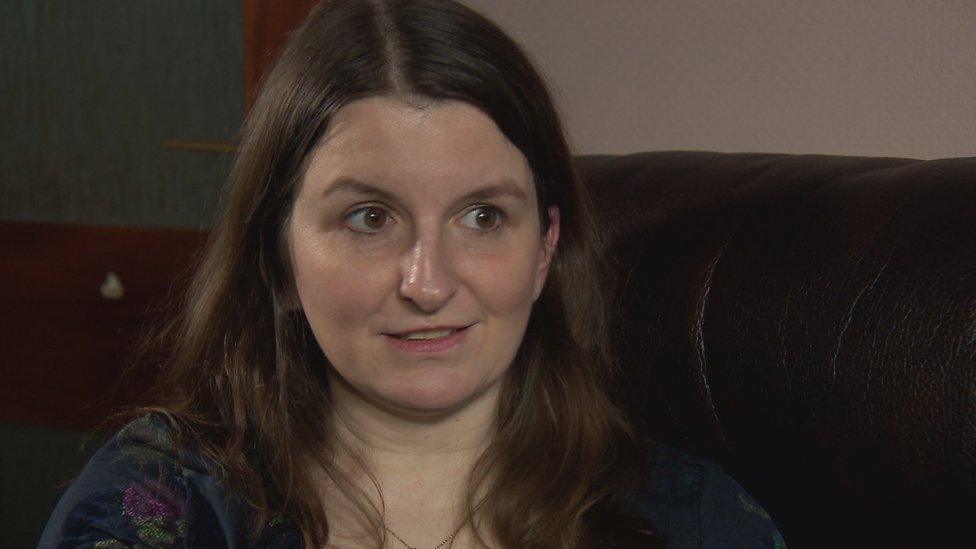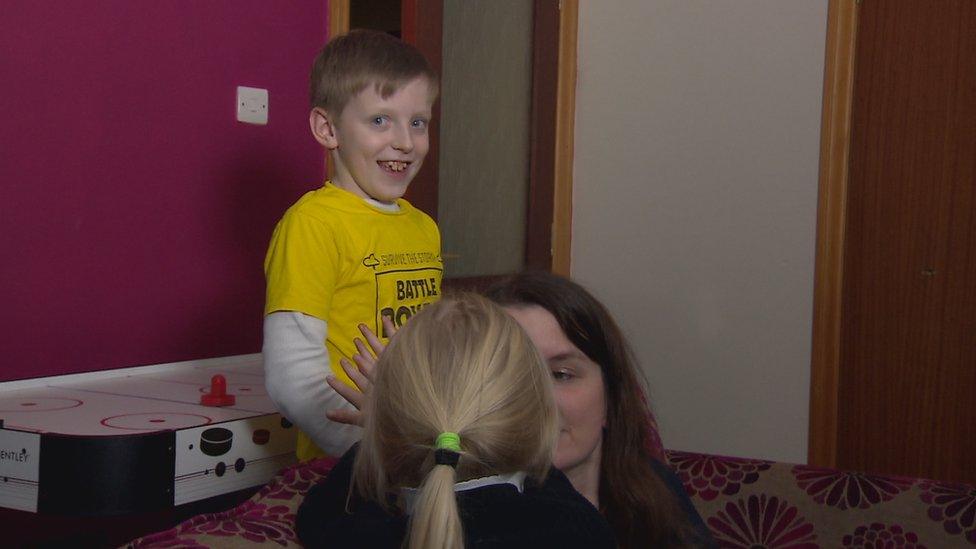Mother's appeal after boy diagnosed with autism when he just needed antibiotics
- Published
'Overnight, something went very wrong'
A mother is calling for greater awareness of a little-known condition she believes changed her easy-going son overnight.
Alison Maclaine fears some children are being misdiagnosed with autism and mental health issues when they are really suffering an infection which can be treated simply with antibiotics.
Her eight-year-old son Jack suffered distressing personality changes and "lost a year of his life".
And she said she was left "in despair" that she and her family had "no quality of life".
Now Alison believes he was suffering from Paediatric Acute-onset Neuropsychiatric Syndrome (PANDAS), triggered by a streptococcal infection - a condition that can be treated with simple antibiotics and anti-inflammatories.
Something wrong
Jack went to bed one Friday in January last year, looking forward to a football tournament he was playing in the next day.
But on arrival at the venue on Saturday morning he became overwhelmed with anxiety. After several attempts, he was unable to enter the building.
At home in Dumfries, Alison realised something was very wrong.
She told the BBC: "He started to repeatedly apologise. He said he didn't deserve to have fun, didn't deserve to have friends, didn't deserve to have nice things, didn't deserve to play football.

Alison Maclaine knew her son's diagnosis was not right and did her own research into his symptoms
"That eventually led to 'I don't deserve to live, when I get home I am just going to sit outside until I freeze to death'."
When it came to bedtime, Jack refused to have covers and pillows and started to repeat that he needed to die, until he fell asleep.
The following day saw his behaviour sink further.
Alison said: "One of the worst things in the world must be listening to your child telling you he wanted to die and asking you to help him."

What is PANS/PANDAS?
According to the charity PANS PANDAS UK, PANS (Paediatric Acute-onset Neuropsychiatric Syndrome) is a neuropsychiatric condition which is triggered by a misdirected immune response which results in an inflammation of a child's brain.
PANDAS is a subset of PANS, triggered by a misdirected immune response to a streptococcal infection which results in an inflammation of a child's brain.
Happening very quickly, this can cause a child to exhibit symptoms including anxiety, aggressive behaviour, depression, clumsiness, insomnia and the onset of obsessive-compulsive disorder.
It was first recognised in the United States in 1998 where PANS PANDAS charities estimate as many as one in 200 children could be affected.
In 2018, the World Health Organisation recognised the condition, but in the UK it is not widely known.
There is no clear test for the condition so doctors often have to rule out psychiatric conditions. The immediate response to antibiotic or anti-inflammatory treatment is often what confirms the condition.
The charity PANS PANDAS UK said a failure to understand the condition in the UK means that children are regularly wrongly referred to Child and Adolescent Mental Health Services (CAMHS).

'Absolute despair'
Jack then became aggressive and withdrew from his beloved younger sister Cara. He would become irritable and angry and started to regress, playing with baby toys.
Over the next several months he was repeatedly diagnosed as having autism and severe anxiety.
But Alison, herself a psychiatrist, disagreed.
She said: "It got to the point where I really felt absolute despair.
"I felt that he had no quality of life, we had no quality of life. There were times when I contemplated things."

His family feels that Jack is "back"
That despair led to Alison doing her own research and the discovery of PANS and PANDAS.
Alison said reading the symptoms was like reading a description of her son and his behavioural changes.
Jack was finally diagnosed privately by a consultant paediatrician in England and treated with simple antibiotics.
They worked overnight and Alison had her son back.
She said: "Jack responded dramatically to the treatment. He hadn't left the street in five months except for school. After two days on antibiotics he wanted to come to Morrisons with me and Cara. It felt like Jack was back."

Dr Tim Ubhi finally diagnosed PANDAS in Jack
Alison is frustrated now, believing if Jack had been given got antibiotics when he first presented to the GP in January, the outcome would have been different.
She said: "It is so frustrating knowing the treatment was so simple. Now I hate to think there are other children in the situation that they have this disorder that has not been picked up on and have been sent down a mental health/psychological route which can't fix the problem."
Dr Tim Ubhi, who diagnosed Jack's condition, said: "The problem here is if we do not recognise this condition and we ignore it, potentially there are children out there who are suffering who could actually get treated and actually improve their symptoms.
"So we have a responsibility as physicians to think about this as a condition and do the work to actually create an awareness of what the condition is doing in the UK."
A Scottish government spokeswoman said: "We appreciate that watching any loved one suffer is heartbreaking, even more so when it is a child.
"We are working together with partners to improve the outcomes and support for adults and children with rare conditions, and ensure that everyone receives the appropriate treatment.
"Ministers are unable to make or influence clinical decisions or definitions, and it would not be appropriate for them to do so."
If you, or someone you know, have been affected by mental health issues, these organisations may be able to help.